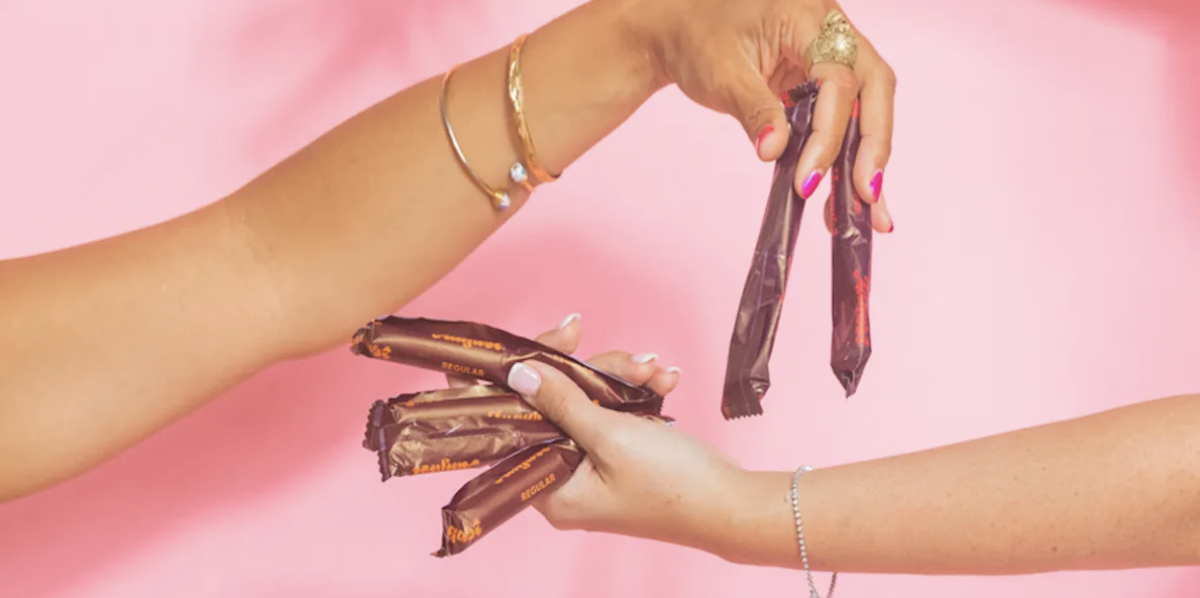A bathroom stall door slams open. A girl reaches into a small container next to the sinks and fishes out a colorful plastic square. She quickly unwraps it, revealing a pad without wings.
Since the 2019-2020 school year, WIS has provided free pads and tampons in the girls’ bathrooms. However, some students are frustrated by the low quality and non environmentally friendly nature of the products.
Junior Sophia Al-Samarrai only uses the products in case of emergency. “It’s nice that we have them and that they’re free,” she said. “But the pads are the worst. They don’t have wings… They don’t last very long. And they’re just cheap. ”
Alumna Lulu Moore was frustrated by the poor quality of the tampons provided by the school. “If you’re a public school, you might not have all the resources,” she said. “But you’re a private school that gets a lot of money and a lot of donations and a lot of tuition from all these families. And especially when it comes to tampons, those things have potentially dangerous side effects [like Toxic Shock Syndrome (TSS)].”
Sophomore Martina Tognato Guaqueta noticed these flaws and is working with ISU to replace the current products. Tognato Guaqueta hopes to implement August’s products, which are made of high quality cotton and are biodegradable.
“Sustainable period products are really important because they offer a way to diminish the environmental impact of WIS as an institution,” Tognato Guaqueta said. “They also function as an example of incorporating sustainable products into one’s day to day life.”
Each year in the US, 12 billion pads and 7 billion tampons are disposed of, which often end up in oceans and waterways, according to Stanford University. “That stuff is so bad for the environment,” Al-Samarrai said. “I feel like I go through so much of it every month. If you think about a school, the amount of girls on their periods all the time [means there’s] so much plastic waste.”
Another issue is a stigma around periods, which students and alumni feel the administration fails to address. Thus, students must take on the issue themselves.
The initiative behind free period products was completely student-driven. During the 2018-2019 school year, then seniors and ISU Presidents Moore and Marianna Ioannou focused their presidency on providing tampons in the girls’ bathrooms.
Despite Moore proposing the idea in her sophomore year, it took until the end of her senior year to officially implement the products. “Everything with the administration is a bureaucratic process,” she said. “It was a lot of [empty] promises… If you have two young girls pushing for some form of initiative, it’s like, ‘Okay, let’s brush them off.’ But with consistency and an agenda that we stayed true to, we were able to make something happen.”
After approving the initiative, the administration took several months to figure out the logistics with the janitorial crew. So, for the first few months of the 2019-2020 school year, then junior Clementine Rotsaert stocked the bathrooms by hand. “Every Sunday, I would go to CVS, buy 20 boxes of tampons, and then Monday I would run around school and put them into all the bathrooms,” she said.
Although the school did not take the lead on providing free period products, the primary and middle school health curriculums both cover periods. In fifth grade, a puberty unit introduces students to periods. Additionally, in sixth grade, all students “look at tampons and pads and pass them around to desensitize and get familiar with the feminine products,” according to Middle School Counselor Marilyn Wilson Odhiambo.
However, Rotsaert was dissatisfied with the period education she received. “The only thing I remember, which is instilled in my memory, was that the nurse was wearing white pants and she was like, ‘Look, guys, you can still wear white pants,’” she said. “We didn’t learn how to put in tampons or about [TSS] or that you can either wear pads or tampons.”
Al-Samarrai feels that the lack of a comprehensive period curriculum creates a stigma around getting your period for the first time. “We didn’t talk about anything to do with periods,” she said. “The focus was much more on boys and reproductive health and sex. I remember getting [her period] and being like, ‘Oh my god, it’s such a big deal.’”
Ultimately, although Moore is frustrated by WIS’s flawed period education, she is grateful that she and Ioannou left behind a tangible legacy in the form of the products. “I think the fight for feminine products represents students… realizing a need, and realizing that it wasn’t being fulfilled by the powers that should be fulfilling it,” Moore said. “[Ioannou and her] legacy just represents two kids who wanted to leave some form of change behind.”
By Maia Nehme

































































